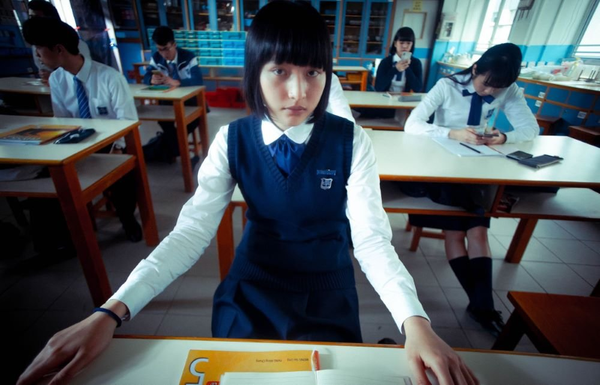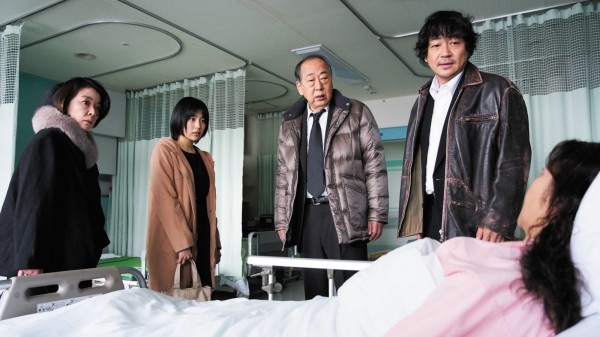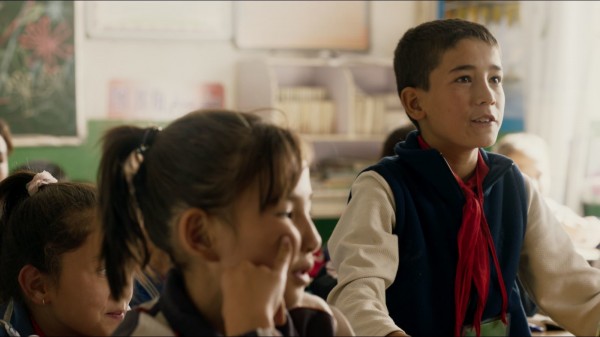-
SONG LANG (Leon Le 2018)
LEON LE: SONG LANG (2018)

ISAAC AND LIEN BINH PHAT IN SONG LANG
Gorgeous Vietnamese melodrama of sadness, loneliness and art
"Song Lang takes place during the peak of our cải lương scene, which in the 70s-80s was a big form of theater entertainment for all classes. It pays considerable amount of respect to the genre, making it the vehicle to bring our two leads together. the movie evidently draws heavy inspiration from the great Wong Kar-wai, so much so that some of these shots and set designs looked like they were pulled straight out of Happy Together (1997), a very appropriate inspiration considering the type of romantic relationship both films chose to focus on." - tap in Letterboxd.
Part of the charm of the quietly enchanting Song Lang is that it is in its own way almost as artificial as a cải lương performance. We have the strong silent type, Dung 'Thunderbolt' (Lien Binh Phat), who's a real softie underneath the tough facade and whose father turns out to have been a folk opera performer, but has been hardened by growing up largely alone. And there's the ostensibly "soft" and sensitive Linh Phung (Isaac), the young cải lương lead performer, who's brave enough to face off a bunch of toughs. They're really much alike, both in their way performers, both beautiful and lonely Vietnamese men. In fact they even look alike, and so they are, strangely, drawn together when Dung comes to collect a debt from Linh Phung, but then sees a performance and later takes Linh in when he conveniently gets drunk, in a fight, and forgets his key on a night when the electricity goes off.
Is this really inspired by Wong Kar-wai and even his sad gay odyssey Happy Together as the Letterboxd contributor says? I don't know. But isn't it nice to think so? The cinematography is not kinetic like Christopher Doyle's for Wong, and rather, is on the static side, like the series of colorful tableaux that take place in the cải lương performances we are treated to in the film. But Song Lang is saturated with soft, subtle colors (those yellows! those greens! those golds!) as subtly as a Wong film, or perhaps something more Southeast Asian. Every scene, every shot, is a delight to the eye, and indeed Song Lang's "never more glorious" Eighties Saigon, though frequently poor and hot, is as romantic and unbearably moody as the saddest and most beautiful of Wong settings.
It turns out Bob Nguyen, the cinematographer, is Australian, like Doyle, but grew up not knowing his work. But as he tells in an article of his own, Leon Le is in fact a big fan of Wong. The wonderful saturation comes from Nguyen's effort with digital means to create the quality of 16mm Fujifilm stock using an Alexa mini camera and a special set of lenses. Our eyes are drawn into each richly lighted scene through the choice of 3:2 aspect ratio.
With its attention to glorious looking people and richly visualized scenes, Song Lang is indeed primarily a homage to a time and place, and a mood piece. As its action draws toward a climax it seems to be constantly slowing down to a still point (the cross-editing of tragic stage performance and tragic action is excruciating). This may be because while now it is moving toward the sad and terrible, earlier it was drawing toward the unmentionable. The homoerotic theme of Happy Together is only timidly touched upon here. But what else could be going on? Only here the love that dare not say its name dare not be thought of.
It's a mood piece also because director Leon Le, who, as he revealed in a recent interview with Ada Tseng in the LA Times, once himself actually dreamed of being in a Vietnamese folk opera, and wants to dwell on the mood of the second upsurge of interest in this form thirty-odd years ago. Hence there are several sequences when we get a good look at an evening of cải lương with Isaac as Linh Phung actually performing in two or three different roles, in full costume. The music is, for an outsider, surprisingly accessible and pleasing. We are allowed to soak up the atmosphere. That matters at least as much as the action. The lovely light and colors tell us that.
Until the end - which brings things to a tragic conclusion, and is so terribly beautiful and sad!
Song Lang, 101 mins., opened in Vietnam Aug. 2018, festival debut Hanoi Oct., showing in at least five other international festivals including NYAFF, where it was screened for this review.
NYAFF Showtimes:
Sunday, July 7
6:30 PM
Last edited by Chris Knipp; 07-03-2019 at 01:25 AM.
-
MR. LONG ミスター・ロン (RYO SAN) (Sabu 2017)
SABU: MR. LONG ミスター・ロン (RYU SAN) (2017)

CHANG CHEN IN MR. LONG
Strong silent type
Mr. Long is a unique, perplexing, and rather uneven kind of pleasure. Its star, Chang Chen, an actor who excels at both martial arts and cooking, as does the lead character he plays, originally starred in the 1991 Edward Yang classic A Brighter Summer Day and subsequently worked with Wong Kar-wai, Hou Hsiao-hsien and Ang Lee. His near-silent performance as "Mr. Long" in Sabu's eponymous film he's been compared to those of Clint Eastwood in the Sergio Leone Westerns. But the personality he project made me think back rather to "Caine, who wanders the earth," the David Carradine "Kung Fu" TV hero of the early Seventies. Something of the inner wisdom is there, though Mr. Long ("Ryo-san" is the original title))isn't shaven-headed like Caine but has a big swatch of hair down one side of his forehead. Ryo-san is a Taiwanese hitman so confident he wipes out a crowd of baddies with nothing but a short knife. This makes for a different kind of wipeout scene.
Owen Gleiberman in Variety points out there is "a tradition, if not a huge one, of movies that feature heroes who are too cool to speak" (Leone's Eastwood), and "Ryo-san" partakes of this tradition (Mark Shilling of Japan Times alludes to this also in his review). The silence is partly due to linguistic limitations, the hitman having been sent to Tokyo but only speaking Chinese. Chang Chen has also been compared to early Johnny Depp here (when he still had the indie cred), and that's partly right. There's something familiar about Chang Chen's face, the more haunting because he doesn't speak to detract from what the face may say to us.
And Sabu is a different kind of Japanese filmmaker (himself a former actor turned director) who indulges his own tastes, moves at his own pace, and, others have said, can really touch you, but also can try your patience and pour on the sugar. There are aspects of Mr Long too manipulative not to be glaring. But there is no denying that the film's odd, meandering byways are interesting and often original to follow if one has the patience, which, at 129 minutes, can be a strain, however.
Ryo-san gets sidetracked, and stuck in Tokyo, because when he's ordered to so another hit, of a bleach-blond baddie in a casino, it doesn't go at all well. In fact he winds up without money or passport, in a gunny sack, being kicked down a hill. He rolls away and saves himself and takes refuge on the outskirts of town, in wrecked buildings, where he encounters a little boy who will be his talisman and companion. The boy is experienced as a caretaker, being in sole charge of his drug addict mother Lily (excellent newcomer Yiti Yao), a still-beautiful ex-yakuza call girl very far down on her luck. His plan is to take a mob boat out of Yokohama, and he has to scrap together the money however he can.
There's nothing here but Ryon-san starts putting things together. The movie is partly a guide to self-sufficiency. This is what makes this hero so compelling. He boils some onions, and the result is delicious. Before long a miscellaneous group of neighbors, a chorus, or maybe just a singularly obvious deus ex machina, comes along to set Ryo-san up Tampopo-like making Taiwan beef noodles from a cart in front of the local temple. They know he barely speaks, never Japanese. That's acknowledged as what makes him cool. When he's not killing people, he's not only resourceful, but a pretty nice guy, if you don't mind his silence.
He has a good effect on the kid and his mom, if you don't mind the child labor: he becomes the on-site dishwasher and general helper for the noodle cart. It's only for a few days, and Ryo-san is refilling both his karma bank and his pocketbook, gathering the ship's passage to Taiwan. The rituals of the food-preparation, Lily's detoxiing under Ryo-san's tough administrations (he simply ties her up, and feeds her broth), and the giddy silliness of the gang of neighbors accumulate. The neighbors are fillers to break the zen monotony, and even perform in a local traditional folk theatrical contest (they're terrible, and come in third).
Eventually the bad guys come back, or course (we've been waiting and waiting for them), in the form mainly of Lily's yakuza handler. You can guess what will happen, but not all the details or the flashbacks that show who Jun's father was, and what happened to him and to Lily earlier - or, above all, what will happen later after Ryo-san has made it back for a while to Kaohsiung City, a massive port town in southern Taiwan. Prepare to shed a tear in spite of yourself.
Sabu (Hiroyuki Tanaka) is a Japanese actor turned filmmaker. He has a second film included in the 2019 NYAFF, the omnibus film Jam.
Mr. Long ミスター・ロン (Ryu san), 129 mins., debuted at the Berlinale 13 Feb. 2017 and at least nine subsequent showings at international festivals have taken place. Released in Japan in 2017 and Italy 2018. It was screened for this review as part of the NYAFF in July 2019.
NYAFF Showtime:
Monday, July 8
9:15 PM
Last edited by Chris Knipp; 07-05-2019 at 11:53 AM.
-
G AFFAIRS (G SAAT) (Lee Cheuk Pan 2019)
LEE CHEUK-PAN: G AFFAIRS (G SAAT) G殺 (2019)

HANNA CHAN IN G AFFAIRS
Hong Kong through a glass, darkly
This is one of those disapproving visions of urban corruption that makes everything look glamorous. Lee Cheuk-pan's debut Hong Kong feature won a raft of awards for its original and ravishingly stylish look at moral decay in a city it describes as "rotting," getting worse, but pretty on the top. Joining things together, besides the six people having some connection to the flying severed head that appears in the jaw-dropping opening shot, is the letter "G." The film playfully rings changes on the letter in a series of segments. G Major is the key of Bach's opening solo cello suite which the boy studying at the posh St Cassions school is constantly practicing in his little apartment, a scene often returned to that provides a still point of calm and beauty, if a fragile one. It's he who's faced with the flying head, along with the man who turns out to have "requisitioned" his apartment.
G words that appear on screen are Gut, Gastric Cancer, Groaning, Girdle, Gay, Gum, Gustav (Mahler and Klimt), Gospel, and finally GF, as the cello boy links with a girl he's long been eyeing in the ambiguous penultimate shot. There's a dog called Gustav, but that's deemed too pretentious and his name is changed to "Guts." Fancy G-word, simple G-word.
Simultaneously this is a crime drama and an experiment in self-conscious fractured narrative, one that takes the time to provide plenty of gorgeous, richly colored urban images. If Hong Kong is really doomed as the film suggests, this makes an elegant liebestod. Besides the letter G, a voiceover narration holds the fragments together, as do the constant references to the city.
The tall, pale schoolboy perfecting his Bach is Tai (pale, sculptural newcomer Lam Sen). As he's playing his cello, a man lets in a prostitute and, pulling her hair back savagely, fucks her, while Tai goes on. It's then that the severed head flies in. (This is, by the way, Apartment 6G.) The police come and question Tai, who claims amnesia.
Tai and his St. Cassians classmate Don (Kyle Li) turn out to have been drawn into criminal doings, and Tai's flat has been taken over by a very corrupt cop, Lung (Chapman To of Tsui Wai-kyung's two Infernal Affairs cop movies). Lung's wife dies of gastric cancer and he hooks up with a glamorous but jaded Mainland sex worker, Xao Mei ((Huang Lu)), whose red lipstick and red dress are screen poetry thanks to Karl Tam's lovely cinematography.
Also important is Yu Ting (Hanna Chan), a classmate of Tai and Don and the daughter of Lung, who is smart but constantly bullied. ( "I'm not liked, but I don't care," her voiceover declares.) Yu Ting seems pure as the driven snow, till she becomes involved giving blow jobs to the straitlaced "Christian" teacher Markus (Alan Yuk) and a scandal ensues. (There doesn't seem to be a G-word for cunnilingus, alas.) This event shows there is decadence behind the prim school uniforms the youths in the story are always wearing.
Even though I watched this film under conditions considerably less than ideal, I was impressed by both the sensibility and the style. I almost felt I might be in the presence of a talent worthy of Wong Kar-wai and with the same unique, fractured vision, sui generis, heavy with conceits and eroticism. One must admire the well-worked out screenplay of Kurt Chiang Chung-yu as well as what Richard Kuipers in his admiring Variety review refers to as "Barfuss Hui’s outstanding stream-of-consciousness editing," not to mention Joe Ng's deft score, which neatly traces, and guides us in following, the film's mercurial mood-shifts.
One to watch - not just the film, but the director. This is yet another calling card for Hon Kong's maintaining its unique identity and independence, now again in question.
In Cantonese.
G Affairs/G saat, G殺105 mins., debuted theatrically in Hong Kong and Taiwan in Nov. 2018 and in Japan in Mar. 2019. It has appeared in three festivals: Osaka, Mar. 2019; Fantasia, and NYAFF Jul. 2019. Screened for this review at the latter.
NYAFF Showtimes
Tuesday, July 9
6:30 PM
TRAILER
Last edited by Chris Knipp; 07-04-2019 at 09:25 PM.
-
LYING TO MOM 鈴木家の嘘 (Katsumi Nojiri
KATSUMI NOJIRI: LYING TO MOM 鈴木家の嘘 (2018)

An unpalatable death in the family
"The Suzuki Family Lies" is the more discreet Japanese title of this first feature by Katsumi Nojiri, whose focus on a family coping with the death by suicide of one of its members. Nojiri had this happen with his own brother, and the screenplay is his. This film is a scattershot treatment of the grieving process. There are Kubler-Ross's stages and then some: Nojiri throws the book at the situation. This means it's not particularly realistic - though it's hard to find the humor that some see here. Brevity is the soul of wit. This screenplay is shapeless, roundabout, and heavy-handed. Good ensemble work helps shore it together, but it's much too long.
The pivotal event is the suicide of Koichi (international star Ryo Kase), number one son of indeterminate age (Kase's in his forties, like the director), who's been a "hikikomori" home recluse for some time. When his doting mother Yukio (Hideko Hara) discovers him hanging from the ceiling, it's too much and in her shock she collapses into a coma. She comes to in the hospital with no memory of this trauma and her husband Sachio (Ittoku Kishibe) decides to keep the truth hidden, with cooparation from their daughter Fumi (Mai Kiryo), whose relation with Koichi was complicated, and also his brother Hitochi (Nao Ohmori), who's to pretend Koichi went to work with him in Argentina while Yukio was unconscious.
This leads to such lengths as getting everybody color coordinated Che Guevara T shirts (because Che was born in Argentina) and a colleague sending letters composed by Fumi actually from Argentina, and so on. Of course eventually the time comes when the pretense can hold no more and Yukio finds a sign that Koichi is gone for good.
This process is the mere pretext for explorations of anger, grief, and discovery. There's a strange insurance policy including a certain "Eve," and the father's trips to a brothel, Fumi's relations with group grief counseling sessions, a visit from an obviously fake "medium." If you think of Japanese manners as low keyed and repressed, their personality as shy, scenes here will belie those notions. The most histrionic moments come at the grief circle with Fumi, and the rich woman who offers everyone her homemade pickles and dominates the whole group with her loud intercessions. Eventually Fumi pulls out all the dramatic stops and expresses her anger, and then her guilt, with the group and with the family respectively. There is also consideration of the nature and meaning of death, and where Koichi "went" and so on, especially given that neither Buddhists nor Christians will accept his ashes (though the insurance company pays). And there's the bat that flies around in Koichi's room - like his not-yet-departed spirit - get it?
All this is very interesting, I suppose, if you have the patience for it randomly by itself and are willing to be looking at a grab bag treatment of the subject matter. But the tonal shifts, narrative twists and turns, and numerous unexpected and unnecessary flashbacks mar the artistic structure, assuming there is any. In his Japan Times review Mark Shilling suggests this film "recycles tried-and-true formulas of the local family drama genre." That doesn't sound like much of a recommendation, and the mere fact that "isn't as heavy as you'd expect" (which is open to question) doesn't help much. Still, it might have worked better with a whole lot more thorough editing.
Lying to Mom 鈴木家の嘘/Suzuki-ke no uso, 133 mins., debuted at Tokyo Oct 28, 2018, releasing in Japan Nov. 16. It also showed in the Nippon International and NYAFF, and was screened at the latter (the North American Premiere) for this review.
Showtimes
Wednesday, July 10
6:00 PM

Last edited by Chris Knipp; 07-07-2019 at 10:45 AM.
-
ANOTHER CHILD 미성년 ( Kim Yoon-seok 2019)
KIM YOON-SEOK: ANOTHER CHILD 미성년(2019)

KIM HYE-UN AND PARK SE-JIN IN ANOTHER CHILD
Two teenage girls struggle through their dysfunctional parents' affair and an unplanned pregnancy
This directorial debut by new Korean director (and previously well-known actor) Kim Yoon-seok confronts adultery and the results of an unplanned pregnancy mainly (but not exclusively) from the point of view of two teenage girls "caught in the crossfire." They are not friends, but go to the same school. When the daughter of the woman who has become pregnant by the other girl's father Ju-ri (Kim Hye-jun) finds out about it, she gets in touch with Yoon-ah (Park Se-jin), the adulterous man's daughter.
Ju-ri's married father Kwon Dae-won (played by directorKim himself) is having an affair with Yoon-ah's single mother Kim Mi-hee (Kim So-jin), who owns and runs a restaurant specializing in duck. After she's found out what's happening by spotting her father with Kim Mi-hee , Jun-ri snatches her phone from Yooh-ah to tell Yooh-ah's mother, Yeong-ju (Yum Jung-ah), about the affair.
This may momentarily suggest an alliance of wronged children, but note that it starts with a provocative gesture, and that the two girls were not friends to start with. Since the two girls represent, as it were, different interests in the affair, hostility develops off and on, till there is an alliance again after events have gone badly for the parents. It takes time and events for a sympathy to develop. No one seems to seek help. No collective wisdom comes into play, including, except for one confession scene with Yeong-ju, the church.
Kim Mi-hee decides to have the baby, meaning Yoon-ah is going to have a (much younger) sibling (the girls are around 17). But then Yu-ri's mother Yeong-ju (Yum Jung-ah) has a violent run-in with Mi-hi that seems to precipitate a premature birth. At first the girls become excited by the idea of the baby, a boy, kept in an incubator, but the boy does not survive. As this goes on Dae-won's marriage and his career as well seem to disintegrate, but he doesn't agree to see the mother again.
I think Yoon Min-sik, who wrote about this film for The Korea Herald, is right when she says of the younger actresses playing the daughters that "the chemistry is incredibly good and believable and that director Kim keeps Dae-won from becoming "a generic slimy bastard." However I had trouble getting any foothold on the action. It doesn't seem that Yoon min-sik's defense that the film "is not about what the characters are going to do or what is going on in the story, but their experience and how it affects their lives" quite makes sense. We in the audience have to deal with what happens in the film. (Yoon grants that the film "may not have the strongest story" and lacks catharsis.) And the final gesture with the baby's ashes, in he moment depicted in the picture above, seemed extremely strange and in vary dubious taste, the girls' sudden hilarity arrived at far too quickly. There are good moments here, and numerous encounters between people where sparks fly. But more work is needed next time from actor turned director Kim in the script and editing departments.
Another Child 미성년, 96 mins., debuted 11 Apr. 2019 in Korea; opening 4 July in Singapore. Screened for this review as part of the NYAFF.
NYAFF Showtime:
Thursday, July 11
8:30 PM
Last edited by Chris Knipp; 07-06-2019 at 10:19 AM.
-
A FIRST FAREWELL 第一次的离别 (Wang Lina 2018)
WANG LINA: A FIRST FAREWELL 第一次的离别 (2018)

KALBINUR AND ISA IN A FIRST FAREWELL
Growing up and saying goodbye
The Uyghur people are a persecuted muslim minority in China. Filmmaker Wang Lina, whose debut feature this is, provides an intimate, beautiful picture of a vanishing life. She focuses on children living in a village on the edge of a desert in Xinjiang Autonomous Province. It's not idyllic, but there are moments of great sweetness and beauty. Begin with the sharp, alert features of the main character, Isa Yasan, a boy of ten or so.
Isa, an adorable, sweet, earnest youth. The youngest son of a goat-herding family, he helps his father (Yasan Kasimu) with farm work, herding goats, feeding animals, picking cotton. He also tends to his mother (Ugulem Sugur). An (meningitis) has made her not only deaf and mute, but mentally handicapped in some way that's not quite clear. Isa loves her very much. But one day on his watch she escapes and wanders off. He goes all over rather desperately looking for her. Isa's mom is a worry, and his father wants to put her in a nursing home. (So there is one, somewhere.) Isa goes to school, but maybe not enough. It seems he needs to learn Mandarin better. (We see him briefly in a class, where all chant under an instructor.) But it is the increasing imposition of Mandarin that is cutting off the Uyghurs from their own culture.
Isa spends his free time with his best girl friend, Kalbinur Rahmati, and they have a baby lamb they raise together. Moments they spend together are priceless. Filmmaker Wang Lina captures magic in this and some other scenes of A First Farewell, whose theme is that the world is somewhat leaving Isa behind. We see his older brother Moosa (Moosa Yasan) leave to further his education. This puts more burden of work on Isa. and what of his education, his future? But when we see him lovingly feed milk to a baby goat from a bottle, the moment is all.
Another priceless time is when Kalbinur is picking cotton with her parents (Tajigul Heilmeier and Rahmati Kranmu) and her father sings a poem he wrote for her mother. Kalbinur groves with it in a way that expresses the spirit of all music. And then her mother jokes and teases. Yet Kalbinur says they fight so much she's afraid they will divorce.
This film made me think of the incredible and somehow similar though more strictly documentary, Honeyland (ND/NF), a remarkable feat of humanistic ethnographic documentary filmmaking, which is coming to regular theaters soon (Friday, July 26, 2019). A First Farewell is as remarkable in its own way, more personal, and more staged, but also about a threatened, remote way of life seen from the inside. The filmmaker herself dedicates this poetic film to her own hometown of Shaya in Xinjiang.
There is a Variety review by Richard Kuipers, who relates this stylistically to "fine Iranian films such as Majid Majidi’s The Color of Paradise (1999) and noting that it's primarily geared for young viewers, while also "offering plenty" for adults who "to read between the lines." Indeed its simply, poignant, authentic scenes offer much to ponder, while bypassing Chinese censorship that would have been aroused by reference to the political issues of YUyghur life.
This film is a gem, and there is a top notch team behind it. The editing was by Matthieu Laclau, of Ash Is Purest White, the cool, understated score by Xi Wen, and the cinematography, shot over the period of a year, by dp Li Yong.
A First Farewell 第一次的离别 (Di yi ci de li bie), 86 mins. debuted at Tokyo Oct. 2018 (winning the Asian Future best film award) and also showed at the Berlinale Feb. 2019 and winning the Crystal Bear of the Generation Kplus section there. It was screened for this review as part of the NYAFF. In Uyghur and Mandarin.
NYAFF Showtime:
Thursday, July 11
6:00 PM
Last edited by Chris Knipp; 07-09-2019 at 05:11 PM.
-
FURIE/HAI PHUONG (Le Van Kiet, 2019)
LE VAN KIET: FURIE/ HAI PHUONG(2019)

VERONICA NGO IN FURIE
Vietnamese superstar Veronica Ngo headlines as a mother looking for her kidnapped daughter in genre maestro Le-Van Kiet’s latest crime thriller.
VARIETY review by Elizabeth Kerr: "Another kidnapped child, another parent on a quest for revenge and/or justice. This time around the parent in question is a struggling Vietnamese single mom in writer-director Le-Van Kiet's Furie, a modest but engagingly familiar actioner that has just a fresh enough point of view to make it worth a look for fight fans. ...[an] ideal mix of fisticuffs, a wholly watchable lead, and being a selection from a country we see too little from outside Asia."
I found the shots of local landscape, rice paddies, greenery, wetland, and bush, and the villages just small enough to see crowded without having many people, very attractive and exotic, really feeling "Vietnamese," as if I knew what that was. I didn't find the villains attractive, and I found the heroine's struggle dogged rather than exciting. It was not I story that kept on giving.
Last edited by Chris Knipp; 07-13-2019 at 11:03 PM.
 Posting Permissions
Posting Permissions
- You may not post new threads
- You may not post replies
- You may not post attachments
- You may not edit your posts
-
Forum Rules





 Reply With Quote
Reply With Quote







Bookmarks